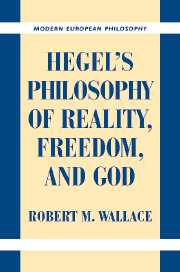Book contents
- Frontmatter
- Contents
- Acknowledgments
- Publication Citation Style
- Preface
- 1 Introduction
- 2 Naturalism, Plato, Kant, and Hegel on Reason, Freedom, Responsibility, Ethics, and God
- 3 Reality, Freedom, and God (Science of Logic I)
- 4 Identity, Contradiction, Actuality, and Freedom (Science of Logic II)
- 5 Freedom, God, and the Refutation of Rational Egoism (Science of Logic III)
- 6 Nature, Freedom, Ethics, and God (The Philosophy of Nature and the Philosophy of Spirit)
- 7 Conclusion
- Index
4 - Identity, Contradiction, Actuality, and Freedom (Science of Logic II)
Published online by Cambridge University Press: 05 June 2012
- Frontmatter
- Contents
- Acknowledgments
- Publication Citation Style
- Preface
- 1 Introduction
- 2 Naturalism, Plato, Kant, and Hegel on Reason, Freedom, Responsibility, Ethics, and God
- 3 Reality, Freedom, and God (Science of Logic I)
- 4 Identity, Contradiction, Actuality, and Freedom (Science of Logic II)
- 5 Freedom, God, and the Refutation of Rational Egoism (Science of Logic III)
- 6 Nature, Freedom, Ethics, and God (The Philosophy of Nature and the Philosophy of Spirit)
- 7 Conclusion
- Index
Summary
Introduction to Chapters 4 and 5
I indicated in the two previous chapters that Hegel seems to have at least two major goals in his account of freedom. The first is to show that one cannot be fully free while regarding some free agents (as Kant says) “merely as means” – having an attitude towards them that doesn't fully reflect their capacity for freedom. (How one's attitude towards free agents could fully reflect their capacity for freedom, remains to be spelled out.) Hegel's second major goal is to show that it is reasonable to regard freedom, in the strong sense of the word that he shares with Kant, as a full reality, and not as something that one can take seriously only by postulating a parallel “world” or “standpoint” for it to inhabit. Obviously, the practical relevance of the first goal is likely to depend, to a considerable extent, on success in achieving the second goal, which is why (if my interpretation in Chapter 3 is correct) Hegel addresses the second goal almost from the beginning of the Science of Logic.
In the latter part of Chapter 3, I described how Hegel sees success in regard to both of these goals as imperilled by what he calls the “collapse” of being-for-self or true infinity – the “collapse” that leads to what Hegel calls “atomism,” in which individual things (“atoms”) transcend their finite natures by recognizing an “ought,” but immediately short-circuit this transcendence by connecting the “ought” only to their own desire-satisfaction and self-preservation.
- Type
- Chapter
- Information
- Hegel's Philosophy of Reality, Freedom, and God , pp. 141 - 213Publisher: Cambridge University PressPrint publication year: 2005

